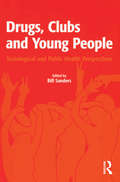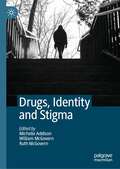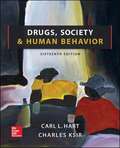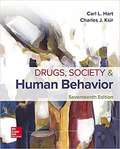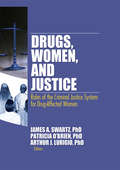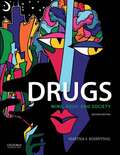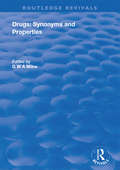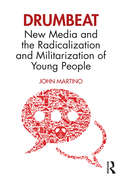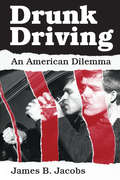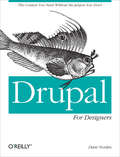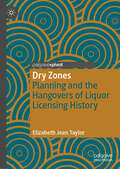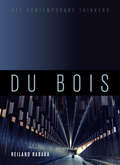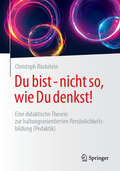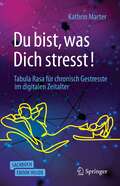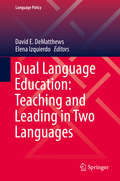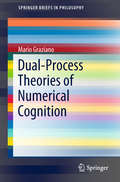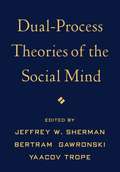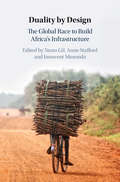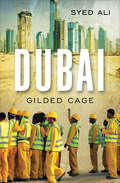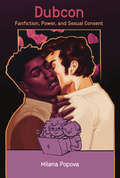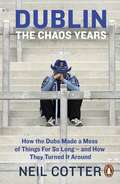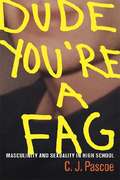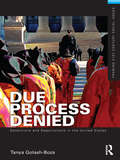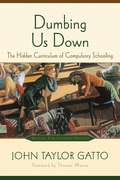- Table View
- List View
Drugs, Clubs and Young People: Sociological and Public Health Perspectives
by Bill SandersIn this volume, contributors employ sociological and public health perspectives to offer insights into behaviours common at raves and nightclubs. The volume provides theoretical observations on illicit club drug use and supply, helping to challenge current orthodoxies on the role of drug use within young peoples' lives. Drawing material from the USA, UK and Hong Kong, the volume allows the demystification of stereotypical presentations surrounding young people who attend clubs and/or use club drugs. This work provides a badly needed and objective analysis of youthful drug use, and a foundation from which future sociological and public studies on young people, clubs and drugs - as well as young people themselves - will benefit.
Drugs, Identity and Stigma
by Michelle Addison Ruth McGovern William McGovernThis book calls attention to the impact of stigma experienced by people who use illicit drugs. Stigma is powerful: it can do untold harm to a person and place with longstanding effects. Through an exploration of themes of inequality, power, and feeling ‘out of place’ in neoliberal times, this collection focuses on how stigma is negotiated, resisted and absorbed by people who use drugs. How does stigma get under the skin? Drawing on a range of theoretical frameworks and empirical data, this book draws attention to the damaging effects stigma can have on identity, recovery, mental health, desistance from crime, and social inclusion. By connecting drug use, stigma and identity, the authors in this collection share insights into the everyday experiences of people who use drugs and add to debate focused on an agenda for social justice in drug use policy and practice.
Drugs, Society and Human Behavior
by Charles Ksir Carl HartDrugs, Society and Human Behavior provides the latest information on drug use and its effects on society as well as on the individual. Trusted for more than 40 years by both instructors and students, this authoritative resource examines drugs and drug use from a variety of perspectives--behavioral, pharmacological, historical, social, legal, and clinical. The 16th edition includes the very latest information and statistics and many new timely topics and issues have been added that are sure to pique students' interest and stimulate class discussion.
Drugs, Society, and Human Behavior
by Carl L. Hart Charles J. KsirDrugs, Society and Human Behavior provides the latest information on drug use and its effects on society as well as on the individual. Trusted for more than 40 years by both instructors and students, this authoritative resource examines drugs and drug use from a variety of perspectives―behavioral, pharmacological, historical, social, legal, and clinical. The 17th Edition includes the very latest information and statistics and many new timely topics and issues have been added that are sure to pique students’ interest and stimulate class discussion.
Drugs, Women, and Justice: Roles of the Criminal Justice System for Drug-Affected Women
by Arthur J. Lurigio James A. Swartz Patricia O’BrienA unique interdisciplinary exploration of a pressing social issueThe numbers of women offenders involved in the correctional system are quickly growing. Drugs, Women, and Justice: Roles of the Criminal Justice System for Drug-Affected Women gathers a distinguished group of researchers and policy analysts into one volume to explore the broad social and individual implications of current policy and practice pertaining to women in the criminal justice system. This valuable resource provides readers with a superb overview of the current state of knowledge and provides recommendations for new directions. Each top-notch chapter was originally presented at the 2005 Drugs, Women, and Justice Symposium, held on the University of Illinois at Chicago campus and sponsored by the Jane Addams College of Social Work Substance Abuse Research Collaboration through a grant from the National Institute on Drug Abuse.Traditionally, criminal justice studies and rehabilitation programs have focused on male offenders. Recent studies reinforce the current evidence that females should have their needs addressed differently. This unique book presents the latest research and thinking in complex and still emerging areas of policy and treatment for women in the criminal justice system.Topics in Drugs, Women, and Justice: Roles of the Criminal Justice System for Drug-Affected Women include: characteristics of drug-involved women in the criminal justice system the negative impact on families of punitive drug laws and child welfare legislation assessing and managing the service needs of children whose mothers have been arrested influences of feelings of isolation on the course of rehabilitation demographic differences between women in drug treatment and drug-involved women in the criminal justice system service needs of women released from prison a program developed for women who have survived traumatic violence, working in the street economy, and the criminal justice system the direct and indirect impact of mass incarceration on women and more Drugs, Women, and Justice: Roles of the Criminal Justice System for Drug-Affected Women is essential reading for researchers, criminologists, sociologists, social workers, psychologists, clinicians, feminists, and policymakers in the areas of social welfare, criminal justice, and drug policy.
Drugs: Mind, Body, and Society
by Martha S. RosenthalWritten in a contemporary and accessible voice, Drugs: Mind, Body, and Society offers more than knowledge and study skills. It is a multidisciplinary text that provides students with a comprehensive discussion about drugs and drug effects that weaves together physiology, neuroscience, pharmacology, psychology, society, culture, media, history, law, and religion. <p><p>With an emphasis on critical thinking skills, this book teaches students to evaluate research, assess sources of data, and discern fact from opinion, so that they can make intelligent decisions that improve the quality of their lives.
Drugs: Synonyms and Properties (Routledge Revivals)
by G W A MilneThis title was first published in 2000: Drugs play an important role throughout the world. In industrialized countries where a formal approval process governs the introduction of new medicinal agents, thousands of chemicals are in use as drugs. This book provides a detailed picture of this marketplace. Grouped by their medicinal use and biological activity, 8,000 drugs in common use around the world are described. For each, the chemical name and a list of trade names and synonyms are provided; the CAS Registry Number and the European Inventory of Existing Chemical Substances (EINECS) Number are given; the physical properties of each compound are described, and the known biological activity and indicated applications are presented. Indexes, including a master index of name and synonyms, are appended. This compendium should be valuable to physicians, research chemists, biologists and the lay public who, with a single synonym for a drug, will be able to quickly find a thumbnail sketch of the essential information concerning the agent
Drumbeat: New Media and the Radicalization and Militarization of Young People
by John MartinoAs the twenty-first century unfolds society is confronted with the normalization of warfare and political violence and their growing allure for the young. Current global political events highlight the extent to which young people have become the target of both State and non-State actors in the prosecution of war and terror. The conduct of what we can refer to as "social war" has increasingly come to target the young through media (social media, the internet and video games) and more directly through acts of violence (the massacre of children, the reliance on child soldiers, and the use of children in martyrdom operations) as legitimate forms of conduct. The appropriation of the young as political and military materials through the processes of both radicalization and militarization warrants close examination. Drumbeat examines these issues within the context of the ongoing process of militarization and the establishment of a state of perpetual warfare. The book distinguishes between radicalization, which refers to the application of propaganda and ideological methods by non-State agents, and militarization, which refers to the application of propaganda and ideological methods by State agents in order to effectively prosecute war. The focus of this book will be an examination of the mechanisms through which forms of media and other digital and web-based artefacts – social media, video and video games - assist in the militarization and radicalization of the young. There is a growing body of evidence which points to the effectiveness of various forms of media in both the recruitment of young people and the promotion of ideological frames. For example, non-State actors (extremist religious groups and the Alt-Right) have been highly effective in appropriating new media to project their propaganda messages and their appeal to young people. The book also argues that militarization has become a powerful societal force, which is re-configuring the daily conduct of life in the West. Just as radicalization seeks to prepare the young for the conduct of war, militarization also functions to position the broader society for war. This is a new form of the "civilizing process" to which Norbert Elias referred. In this context new media provides the conduits through which this process is legitimized, celebrated and promulgated.
Drunk Driving: An American Dilemma
by James B. JacobsIn this ambitious interdisciplinary study, James B. Jacobs provides the first comprehensive review and analysis of America's drunk driving problem and of America's anti-drunk driving policies and jurisprudence. In a clear and accessible style, he considers what has been learned, what is being done, and what constitutional limits exist to the control and enforcement of drunk driving.
Drupal for Designers: The Context You Need Without the Jargon You Don't
by Dani NordinAre you a solo web designer or part of a small team itching to build interesting projects with Drupal? This hands-on book provides the tools and techniques to get you going. Award-winning designer Dani Nordin guides you through site planning, teaches you how to create solid, user-centered design for the Drupal framework, and shows you tricks for using real, honest-to-goodness, developer Ninja Magick.This book is a compilation of three short guides—Planning Drupal Projects, Design and Prototyping for Drupal, and Drupal Development Tricks for Designers—plus exclusive "director’s material." If you’re familiar with HTML and CSS, but struggling with Drupal’s learning curve, this is the book you’ve been looking for.Get extra material, including an expanded Grids chapter, more recommended modules, and a Short Form Project planLearn how to work user-centered design practices into Drupal projectsChoose the right modules for your project, and discover several go-to modulesUse strategies for sketching, wireframing, and designing effective layoutsManage Drupal’s markup, including code generated by the powerful Views moduleLearn how to work with Drupal on the command lineSet up your development environment and collaborate with other designers and developersLearn the basics of Git, the free open source version control system
Dry Zones: Planning and the Hangovers of Liquor Licensing History
by Elizabeth Jean TaylorThis book tells the story of local-level controls on liquor licensing (‘local option’) that emerged during the anti-alcohol temperance movement of the late 19th and early 20th centuries. It offers a new perspective on these often-overlooked smaller prohibitions, arguing local option not only reshaped the hotel industry but has legacies for, and parallels with, questions facing cities and planners today. These range from idiosyncratic dry areas; to intrinsic ideas of residential amenity and neighbourhood, zoning separation, and objection rights. The book is based on a case study of temperance-era liquor licensing changes in Victoria, their convergence with early planning, and their continuities. Examples are given of contemporary Australian planning debates with historical roots in the temperance era – live music venues, bottle shops, gaming machines, fast food restaurants. Dry Zones uses new archival research and maps; and includes examples from family histories in Harcourt and Barkers Creek, a district with a temperance reputation and which closed all its hotels during the temperance era. Suggesting ‘wowsers’ are not so easily relegated to history books, Taylor reflects on tensions around individual and local rights, localism and centralism, direct democracy, and domestic violence, that continue to be re-enacted. Dry Zones visits a forgotten by-way of licensing history, showing the early 21st century is a useful time to reflect on this history as while some temperance-era controls are being scaled back, similar controls are being put forward for much the same reasons.
Du Bois: A Critical Introduction (Key Contemporary Thinkers)
by Reiland RabakaW.E.B Du Bois is widely considered one of the most accomplished and controversial African American intellectuals in U.S. history. A pioneering historian, sociologist, political economist, and civil rights activist, his masterpiece The Souls of Black Folk remains one of the most widely read books in the history of American literature. In this new book, Reiland Rabaka critically explores Du Bois’s multidimensional legacy, lucidly introducing his main contributions in areas ranging from American sociology and critical race studies to black feminism and black Marxism. Rabaka argues that Du Bois’s corpus, particularly when attention is given to his contributions to the critique of racism, sexism, capitalism and colonialism, can be persuasively interpreted as both an undeniable and unprecedented contribution to the origins and evolution of one of our most important contemporary critical concepts: intersectionality. Du Bois: A Critical Introduction is an indispensable resource for scholars and students of history, sociology, politics, and economics. It will also be very valuable for those working in interdisciplinary fields, ranging from African American studies, critical race studies, and critical white studies to black feminism, black Marxism, and black internationalism.
Du bist - nicht so, wie Du denkst!: Eine didaktische Theorie zur haltungsorientierten Persönlichkeitsbildung (Pedaktik)
by Christoph RöckeleinIn diesem Buch wird die didaktische Basistheorie einer haltungsorientierten Persönlichkeitsbildung in ihren einzelnen Elementen vorgestellt und am Schluss des Buches im Handlungsfeld des haltungsbasierten Coaching gezeigt. Im Kontext der von Christoph Röckelein konzipierten Pedaktik liegt der Schwerpunkt des Interesses auf der Coaching- bzw. der Beratungssituation, also auf persönlichkeitsbildenden Interaktionen. Das Innovative des pedaktischen Ansatzes ist, dass die Haltung im Fokus der Persönlichkeitsbildung steht. Diese Bildungsarbeit kann nur gelingen, wenn der Coach die Haltung, die er vermitteln will, selbst internalisiert hat. Diese Form der Interaktion könnte man auch als (Hin-)Führung zur Selbstführung bezeichnen.
Du bist, was Dich stresst!: Tabula Rasa für chronisch Gestresste im digitalen Zeitalter (Über/Strom: Wegweiser durchs digitale Zeitalter)
by Kathrin MarterViele Menschen nutzen täglich die Vorteile des digitalen Zeitalters: wenn sie mal eben ihr Zugticket mit dem Smartphone buchen, sich von ebendiesem zum vereinbarten Treffpunkt navigieren lassen und dann per Textnachricht erfahren, dass die werten Kolleg*innen ein paar Minuten zu spät kommen, der Tisch im Restaurant online schon reserviert wurde und das „Tisch-Ticket“ per QR-Code gleich mitsenden. Viele Menschen erfahren sich bei aller Erleichterung zunehmend reizüberflutet, überfordert und in der Folge gestresst.Der Begriff und Zustand „Stress“ (heutzutage im Sprachjargon als diffus definierter Normalzustand verankert und schon lange in der Mitte der Gesellschaft angekommen) ist allerdings tatsächlich ein Zustand, der vielfältigen Leidensdruck verursacht und krank macht.Die Autorin unterstützt allgemeinverständlich, anschaulich sowie naturwissenschaftlich und psychologisch fundiert bei der Auseinandersetzung mit Stress, Stressoren und Prozessen der Langzeitgedächtnisbildung. Letztere sind nicht unwesentlich an unserem chronischen Stresslevel beteiligt. Langzeitgedächtnisse, die, häufig schon in der Kindheit geformt, starke negative Glaubenssätze beinhalten. Diese negativen Glaubenssätze erfahren durch die Herausforderungen der digitalen Welt permanente Verstärkung und begünstigen dadurch chronischen Stress - mit seinen für viele Menschen spürbaren Folgen.Das Buch lädt ein, klärt auf und gibt fundierte, anschauliche und handlungsorientierte Ansätze zur Selbstreflexion und Entwicklung einer gesunden Handlungskompetenz gegenüber dem eigenen Stresslevel, folglich der eigenen Gesundheit und dem eigenen Glück.
Dual Language Education: Teaching and Leading in Two Languages (Language Policy #18)
by Elena Izquierdo David E. DeMatthewsThis book provides a comprehensive and interdisciplinary examination of dual language education for Latina/o English language learners (ELLs) in the United States, with a particular focus on the state of Texas and the U.S.-Mexico border. The book is broken into three parts. Part I examines how Latina/o ELLs have been historically underserved in public schools and how this has contributed to numerous educational inequities. Part II examines bilingualism, biliteracy, and dual language education as an effective model for addressing the inequities identified in Part I. Part III examines research on dual language education in a large urban school district, a high-performing elementary school that serves a high proportion of ELLs along the Texas-Mexico border, and best practices for principals and teachers.This volume explores the potential and realities of dual language education from a historical and social justice lens. Most importantly, the book shows how successful programs and schools need to address and align many related aspects in order to best serve emergent bilingual Latino/as: from preparing teachers and administrators, to understanding assessment and the impacts of financial inequities on bilingual learners. Peter Sayer, The Ohio State University, USA
Dual-Process Theories of Numerical Cognition (SpringerBriefs in Philosophy)
by Mario GrazianoThis book presents a philosophical interpretation to numerical cognition based on dual process theories and heuristics. It shows how investigations in cognitive science can shed light on issues traditionally raised by philosophers of mathematics. The analysis will also help readers to better understand the relationship between current neuroscientific research and the philosophical reflection on mathematics. The author seeks to explain the acquisition of mathematical concepts. To accomplish this, he needs to answer two questions. How can the concepts of approximate numerosity become an object of thought that is so accessible to our consciousness? How are these concepts refined and specified in such a way as to become numbers? Unfortunately, there is currently no model that can truly demonstrate the role of language in the development of numerical skills starting from approximate pre-verbal skills. However, the author details a solution to this problem: dual process theories. It is an approach widely used by theorists focusing on reasoning, decision making, social cognition, and consciousness. Here, he applies this approach to the studies on mathematical knowledge. He details the results brought about by psychological and neuroscientific studies conducted on numerical cognition by key neuroscientists. In the process, he develops the foundations of a new, potential philosophical explanation on mathematical knowledge.
Dual-Process Theories of the Social Mind
by Bertram Gawronski Jeffrey W. Sherman Yaacov TropeThis volume provides an authoritative synthesis of a dynamic, influential area of psychological research. Leading investigators address all aspects of dual-process theories: their core assumptions, conceptual foundations, and applications to a wide range of social phenomena. In 38 chapters, the volume addresses the pivotal role of automatic and controlled processes in attitudes and evaluation; social perception; thinking and reasoning; self-regulation; and the interplay of affect, cognition, and motivation. Current empirical and methodological developments are described. Critiques of the duality approach are explored and important questions for future research identified.
Duality by Design: The Global Race to Build Africa's Infrastructure
by Anne Stafford Nuno Gil Innocent MusondaAfrica's rapid population growth and urbanisation has made its socioeconomic development a global priority. But as China ramps up its assistance in bridging Africa's basic infrastructure gap to the detriment of institutions building, warnings of a debt trap have followed. Building upon an extensive body of evidence, the editors argue that developing institutions and infrastructure are two equally desirable but organisationally incompatible objectives. In conceptualising this duality by design, a new theoretical framework proposes better understanding of the differing approaches to development espoused by traditional agencies, such as the World Bank, and emergent Chinese agencies. This new framing moves the debate away from the fruitless search for a 'superior' form of organising, and instead suggests looking for complementarities in competing forms of organising for development. For students and researchers in international business, strategic and public management, and complex systems, as well as practitioners in international development and business in emergent markets.
Dubai: Gilded Cage
by Syed AliThis revealing portrait of the famously wealthy Persian Gulf city investigates the human cost of its miraculous rise to global prominence. In less than two decades, Dubai has transformed itself from an obscure territory of the United Arab Emirates into a global center for business, tourism, and luxury living. With astonishing skyscrapers and tax-free incomes, its rulers have made Dubai into a playground for the global elite while skillfully downplaying its systemic human rights abuses and suppression of dissent. It is a fascinating case study in light-speed urban development, massive immigration, and vertiginous inequality. In Dubai: Gilded Cage, sociologist Syed Ali delves beneath the dazzling surface to analyze how—and at what cost—Dubai has achieved its success. Ali brings alive a society rigidly divided between expatriate Westerners enjoying opulent lifestyles on short-term work visas, native Emiratis who are largely passive observers, and workers from the developing world who provide the manual labor and domestic service needed to keep the emirate running, often at great personal cost. &“At last, a comprehensive expose of the economic and sexual exploitation that erected this utopia of greed. Syed Ali has seen the future in Dubai and it doesn&’t work.&” —Mike Davis, author of Planet of Slums
Dubcon: Fanfiction, Power, and Sexual Consent
by Milena PopovaHow the treatment of sexual consent in erotic fanfiction functions as a form of cultural activism.Sexual consent is--at best--a contested topic in Western societies and cultures. The #MeToo movement has brought public attention to issues of sexual consent, revealing the endemic nature of sexual violence. Feminist academic approaches to sexual violence and consent are diverse and multidisciplinary--and yet consent itself is significantly undertheorized. In Dubcon, Milena Popova points to a community that has been considering issues of sex, power, and consent for many years: writers and readers of fanfiction. Their nuanced engagement with sexual consent, Popova argues, can shed light on these issues in ways not available to either academia or journalism. Popova explains that the term "dubcon" (short for "dubious consent") was coined by the fanfiction community to make visible the gray areas between rape and consent--for example, in situations where the distribution of power may limit an individual's ability to give meaningful consent to sex. Popova offers a close reading of three fanfiction stories in the Omegaverse genre, examines the "arranged marriage" trope, and discusses the fanfiction community's response when a sports star who was a leading character in RPF (real person fiction) was accused of rape. Proposing that fanfiction offers a powerful discursive resistance on issues of rape and consent that challenges dominant discourses about gender, romance, sexuality, and consent, Popova shows that fanfiction functions as a form of cultural activism.
Dublin: How the Dubs Made a Mess of Things for So Long – and How They Turned It Around
by Neil CotterIrish Times Sports Book of the Year Dublin has become the dominant force in Gaelic football, setting new standards of skill and efficiency. But it was not very long ago that the county was a byword for underachievement and disorganization. Every year from 1996 to 2010, the Dubs found new and creative ways of losing, of causing their fans to suffer, and of earning the scorn of the wider GAA public.Based on interviews with former players and coaches, Dublin: The Chaos Years tells the entertaining and sometimes scarcely believable story of how the Dubs managed to make such a hames of things over a period of fifteen years. It also traces the beginnings of the turnaround, as the bad habit of failure began to give way to a healthier culture. Full of frank, witty and sometimes outrageous stories and analysis from the people who were at the centre of it, Dublin: The Chaos Years is a book for every Gaelic football fan.'Fascinating' Kieran Cunningham, Irish Daily Star'This book offers fascinating insight into the egos, dressing room divides, and bad habits which held the county back on the field. ... [It's] full of honest and witty interviews with players, coaches and officials from that revolutionary period.' Darren Frehil, RTÉ Culture'From unwelcoming veterans to arseboxing and collapsing human pyramids to marching to the Hill to startled earwigs to champs, Cotter has it all covered in a very well-written and insightful read.' Kieran Shannon, Irish Examiner'Cotter has done some terrific interviews ... the raw, hard-nosed nature of the Dublin dressing room at the end of the 1990s jumps from the page. ... Well worth anyone's time' Malachy Clerkin, Irish Times Sports Books of 2018
Dude, You're a Fag: Masculinity And Sexuality In High School
by C. J. PascoeHigh school and the difficult terrain of sexuality and gender identity are brilliantly explored in this smart, incisive ethnography. Based on eighteen months of fieldwork in a racially diverse working-class high school, "Dude, You're a Fag "sheds new light on masculinity both as a field of meaning and as a set of social practices. C. J. Pascoe's unorthodox approach analyzes masculinity as not only a gendered process but also a sexual one. She demonstrates how the "specter of the fag" becomes a disciplinary mechanism for regulating heterosexual as well as homosexual boys and how the "fag discourse" is as much tied to gender as it is to sexuality.
Due Process Denied: Detentions and Deportations in the United States (Framing 21st Century Social Issues)
by Tanya Golash-BozaDue process protections are among the most important Constitutional protections in the United States, yet they do not apply to non-citizens facing detention and deportation. Due Process Denied describes the consequences of this lack of due process through the stories of deportees and detainees. People who have lived nearly all of their lives in the United States have been detained and deported for minor crimes, without regard for constitutional limits on disproportionate punishment. The court's insistence that deportation is not punishment does not align with the experiences of deportees. For many, deportation is one of the worst imaginable punishments.
Dumbing Us Down
by Thomas Moore John Taylor GattoWith over 70,000 copies of the first edition in print, this radical treatise on public education has been a New Society Publishers' bestseller for 10 years! Thirty years in New York City's public schools led John Gatto to the sad conclusion that compulsory schooling does little but teach young people to follow orders like cogs in an industrial machine. This second edition describes the wide-spread impact of the book and Gatto's "guerrilla teaching."John Gatto has been a teacher for 30 years and is a recipient of the New York State Teacher of the Year award. His other titles include A Different Kind of Teacher (Berkeley Hills Books, 2001) and The Underground History of American Education (Oxford Village Press, 2000).
Dumbing Us Down: The Hidden Curriculum of Compulsory Schooling
by Thomas Moore John Taylor GattoWith over 70,000 copies of the first edition in print, this radical treatise on public education has been a New Society Publishers' bestseller for 10 years! <P><P>Thirty years in New York City's public schools led John Gatto to the sad conclusion that compulsory schooling does little but teach young people to follow orders like cogs in an industrial machine. This second edition describes the wide-spread impact of the book and Gatto's "guerrilla teaching."John Gatto has been a teacher for 30 years and is a recipient of the New York State Teacher of the Year award. His other titles include A Different Kind of Teacher (Berkeley Hills Books, 2001) and The Underground History of American Education (Oxford Village Press, 2000).
